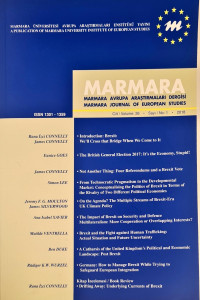Öz
The results of the 2017 general election were a shock to most observers of British politics. The Conservative Party led by Theresa May lost its majority in the House of Commons winning only 42.4% of the vote. Labour, on the other hand, had much better results than expected results attracting 40% of the votes. This article seeks to explain what is behind these surprising results. Drawing on the theoretical literature on economic voting, this article argues that the impact of austerity influenced the choices of a sizable section of the electorate. But voters are heterogeneous, that is, they are motivated by a variety of factors. In the case of the 2017 general election, Brexit was one of the factors that shaped the preferences of some voters.
Anahtar Kelimeler
Brexit hung parliament austerity economic voting Conservative Party
Kaynakça
- Awate, Maxta, Krucial and Slix (2017), “#Grime4Corbyn: Grime Artists Explain Why They Backed Labour”, The Guardian, 13.06.2017, <https://www.theguardian.com/commentisfree/2017/jun/13/corbyn-grime- stars-labour-grime4corbyn-awate-maxsta-krucial-slix>, (04 October 2018).
- Bale, T. and Webb, P. (2017) “’Honey, I Shrunk the Majority’: Theresa May and the Tories”, Political Insight: 20-3.
- Bartels, Larry M. (2013) “Political Effects of the Great Recession”, The Annals of the American Academy of Political and Social Science, Vol. 650, The Effects of the Great Recession: 47-75.
Ayrıntılar
| Birincil Dil | İngilizce |
|---|---|
| Bölüm | Makaleler |
| Yazarlar | |
| Yayımlanma Tarihi | 1 Ağustos 2018 |
| Yayımlandığı Sayı | Yıl 2018 Cilt: 26 Sayı: 1 |


